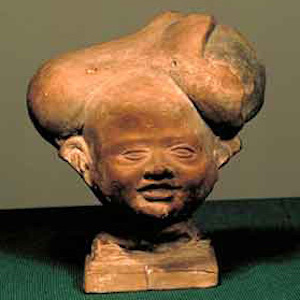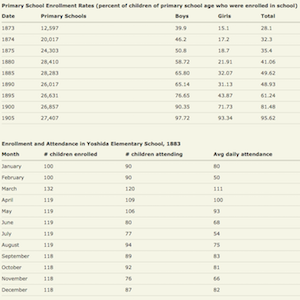Asia

Wanderings of a Pilgrim in Search of the Picturesque
From 1600 to the early 1800s, few officials of the English East Indian Company lived with English wives in India. This practice began to change as transportation became easier with the development of steamships.

Rajah Rammohun Roy Excerpts
Ram Mohan Roy (1774-1832), a highly educated Bengali brahman from a well-to-do landed family, had worked in the lower levels of the Company bureaucracy.

Letter to Panduranga Joshi Kulkarni
Although the self-immolation of Hindu widows was less common in western India than in Bengal, this letter confirms its occurrence in Maratha-ruled areas during the 1700s.

Terracotta Smiling Children Heads
These two terracotta heads of smiling children stem from excavations at Bulandi Bagh in Patna, India. The molded figures, about 10 cm. (4 in.) high, are rare and significant, both because of their naturalistic facial expressions and technical artistry.

Thai Palm Leaf Fish Mobile for the Cradle
The fish mobile above is a type traditionally hung over the cradle in Thailand. It is made from the folded, woven leaves of the palm, especially in Phra Nakhon Si Ayutthaya province. The fish depicted is the Thai barb, or carp, which is a symbol of prosperity.

Goha Gives His Son a Lesson About People
The anecdote is a lesson to a child who is probably at the adolescent stage of life, and very concerned with how peers and others view him. The experience of the father and son pair shows the futility of trying to act on fickle public opinion.

Puppeteers Painting
This is an ink painting on a scroll by Hanabusa Itchô (born Taga Shinkô), a Japanese artist of the early Tokugawa period (1600–1868). Tokugawa artists typically used pen names and Itchô used several names at different times as an artist and poet.

Meiji Era School Attendence
Below are two tables that reveal both the accomplishments and the limitations of Meiji educational reforms. Table 1 shows an impressive increase in the number of schools and the enrollment rates for both girls and boys, one that culminates in 1905 with near-universal enrollment rates.

Emperor Jahangir Weighing His Son Khurram in Gold
The finely detailed miniature painting in an album created for the Emperor Jahangir (reigned 1605–1627) of the Mughal Empire in India shows a ceremony initiated by Jahangir's father, Akbar the Great (reigned 1556-1605), Jahangir's father.

Tet Trung Thu Festival in Vietnam
The photographs show children during the mid-Autumn Harvest Festival, or Tet Trung Thu in Vietnam, a children's festival associated with the full moon.